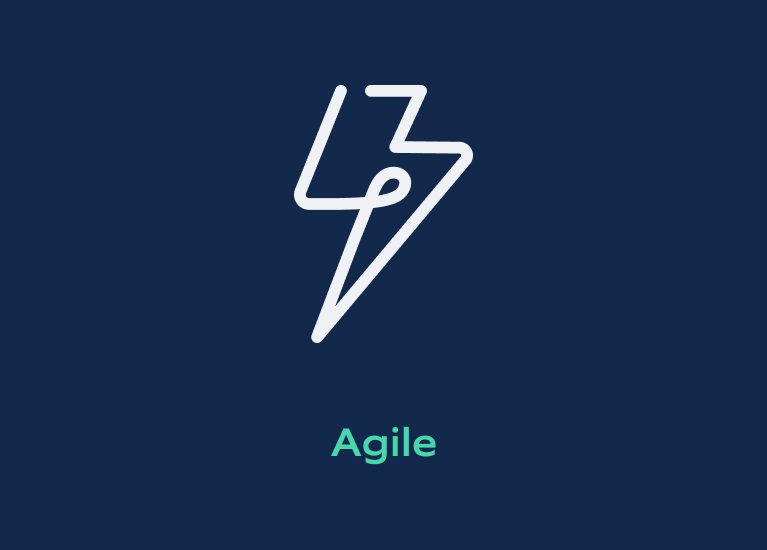CARING is a core value at Nagarro. It is also an acronym for six values that provide us with a guiding light and reflect the unique culture of Nagarro. During the last couple of months, I had the pleasure of interviewing colleagues from all over the world about their interpretation of these values: Client-centric, Agile, Responsible, Intelligent, Non-hierarchical, Global, and – of course – CARING. I ended up creating a blog series about this; here’s the second one from the CARING series, focusing on A for Agile.
Although we both are based out of the same office, it was only recently that Christoph Reissner and I had the chance to chat about his favorite Nagarro value over a cup of coffee. He is a passionate hobby-agilist, so selecting the value he wanted to talk about was a no-brainer: A for agile.
"Agility does not work for us" – Christoph Reissner would raise his eyebrows at this sentence. He encourages everyone to get familiar with this topic and believes that all companies should try out agile ways of working, as the internal and external added value is enormous. Christoph joined Nagarro in 2012 and has been serving our public and utility customers; he is also active in the new customer segment. Read on to learn more about Christoph’s views and the importance of agility in his personal life.
[Sabrina Floh] Christoph, please answer my first question intuitively: What makes Agile special to you?
[Christoph Reissner] Agility gives me the opportunity to approach a task with certain freedom. That means there are no fixed concepts or guidelines. Having an agile mindset allows me to respond effectively to customers, and to better understand their requirements, needs as well as the topics of interest. This is very important here at Nagarro, as we are selling services that require a lot of explanation and advice. This is because sometimes, customers don't know their requirements, right from the start. You have to – rather, you must - take your time to understand their requirements. And this often takes several iterations.
What comes to your mind instantly, when you think of the term ‘Agile’?
Freedom in choosing the path to achieve a certain goal.
Sounds interesting. What do you mean, exactly?
Well, for me, this is an expression of agile work; freedom is personally important to me in my everyday life. It is a combination of activities at the customer’s place, in our office, or even in my home office. Some things work better here than there. To recognize that, and have the freedom to accordingly control that, is essential for me. I can also constantly think about whether those areas are still balanced, or whether I have to tweak something to balance them again.
Did you deal with the topic of Agile before joining Nagarro?
Absolutely, but more in terms of theory and literature. I have always been interested in KVP (Kaizen), the continuous improvement process in the Japanese automotive industry. Actually, there is tangible difference from what we do in software development. For me, KVP is something like the precursor of agile software development. I start with something and when I continue, I see what learning experiences I can take out of it to make improvements in the end. The biggest surprise to me was that the development of the whole process did not originate in IT but came from the business departments instead. That was more than 20 years ago. I am very pleased that the topic also found its way into software development later.
So, how did you go from reading about agile work to implementing the same?
Well, three things come spontaneously to my mind. Firstly, a few years ago, I attended an internal training course on agile working and got to know the Kanban board. Among other things, we did instructive, entertaining and of course, very funny exercises with Legos. Secondly, I also sold our offers from the agile segment to our customers, which obviously required studying extensively about that topic in advance. Lastly, (and this was most important for me, because it gave me an incredible boost regarding agile working) when we moved to our new location in Austria, Nagarro’s new office was built according to agile principles; there was internal agile training for all the functional areas; and thanks to the IT structure which offers independence of location, one could work with a lot of agility and flexibility every day.
Are there any moments when you still feel insecure about agile working?
Yes, and I always find a helping hand from our agile coaches there. For example, when on the way to pre-sales appointments or projects, I use the travel time to exchange thoughts with our agile coaches. Just to see how they approach things at work as well as in their private lives. It is very helpful and important to me that I have access to their experience.
You just mentioned private. Do you also use agile methods in your personal life?
A guiding principle that shapes me in my professional as well as private life is that a half-finished concept that you start to implement has much more value than a perfect plan-in-a-box. I strive to live by this approach, and I try to get into action as quickly as possible. It is important to gather experience and adjust your course continuously to ensure that the targets are achieved. There are neither ‘perfect’ practices nor ‘mistakes’. All you have is important feedback. I try to pass all these approaches to my children as well.
At home, we even use a Kanban board! In the living room, we have a 2x2 meter magnetic writing board. As you might expect, I have the columns Backlog, To Do, Doing, and Done on it. Each family member has his or her own line, where we note down our respective activities. The greatest added value is that each family member can transparently see the progress and activities of the other ones, i.e. not only which activities are pending, but also how the whole ‘family system’ is managed. This is an incredible amount of overall activities!
So, one can say that you implemented the agile principles you learned, at home too?
Right! At that time, I was already inspired by the cooperation in marketing and sales. For upcoming events, we used Kanban boards to track which tasks were still in the backlog or just about to be completed or done. I think this visualization was extremely valuable. This led me to redesign our living room. In the beginning, this big black wall needed some time to get used to, but in retrospect, we are all glad that we have it. So yes, I took the learning experience from the job home with me.
Do you identify other areas in Nagarro where agility is important?
Yes, especially in agile consulting, where we swear by agile. And in everything that has to do with agile components e.g. agile testing and agile software development; and especially in innovation and digitization projects such as "Smart Glasses". All this would not work without agility.
Do you think that our customers feel the effort behind our value ‘Agile’?
I truly believe that! Especially in two ways: firstly, through our new modern office, in which more and more customer meetings take place. It's simply impressive, because with this office, you get to know the agile components of working with desk-sharing or the many rooms for short-term assembly. This flexibility can be transported very well.
And secondly, through past projects. Just recently, I worked on several agile software projects where agility became a critical success factor. The customer might not have been completely convinced to implement them in agile mode in the beginning, but then relied on our experience. In retrospect, the customer was very happy and grateful.
Does that mean you also get direct feedback that agile working is the right way?
We always get direct feedback. Recently, we completed an important project for a customer, where the review showed that the project was a success, thanks to its agile approach.
You are an expert who has seen many different companies. What importance do other companies assign to this value?
I think that the word agility has a different meaning for every company. But, in order to judge it, you have to try it. This means that there may be companies where it makes sense to switch absolutely 100% to agile, and then there may be companies where it is more of an intermediate step, because an evolutionary approach is more appropriate first. The crucial thing for me is that you should learn and try out agile principles, because only then you can judge whether it brings relief or not. What I wouldn´t accept at this point is when a company says "this is not for us" without ever trying it out.
Christoph, any last thoughts that you want to share?
As a closing example, I would like to mention a customer I recently visited. Just a year ago, he told me "agility does not work for us." Last week, I received an e-mail where he asked about an exchange on agile principles. He is now very grateful to me for always staying so persistent and putting the keyword ‘Agile’ in his head at every opportunity. It seems "Agile brainwashing a lá Christoph" works 😉
This wraps up another interesting conversation in our series of discussions with Nagarrians about their favorite core value. Check out this cool video where other Nagarrians reflect on this core value:
You can view the first blog from our CARING series on being C for client-centric here. Our next blog in this CARING series will talk about what it means to be R for Responsible. Stay tuned!






